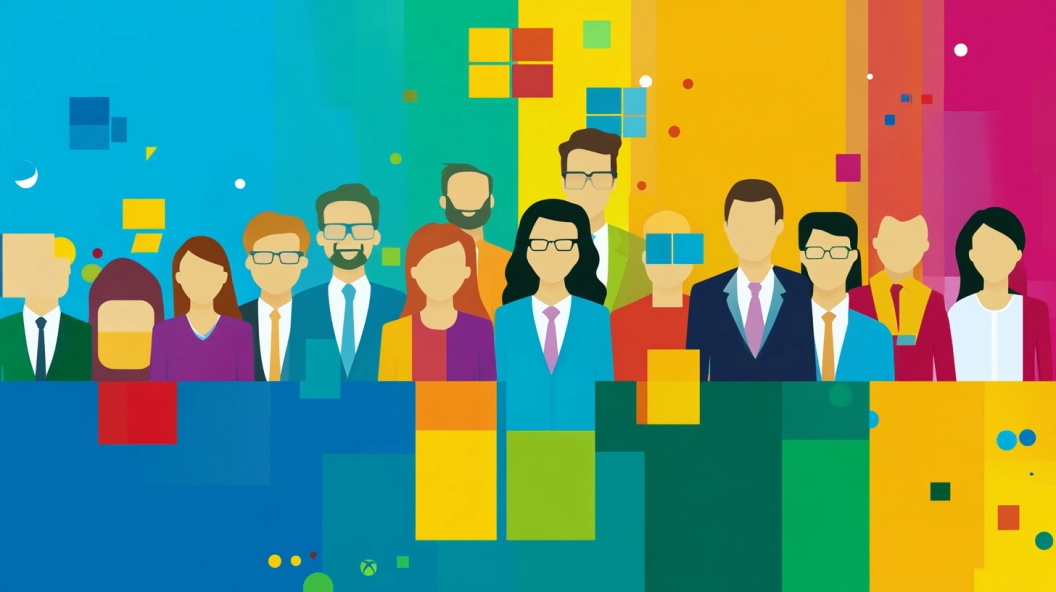The Importance of Soft Skills When Recruiting Microsoft Experts

In today's competitive job market, your ability to showcase soft skills can set you apart. These skills, such as communication and adaptability, are crucial for success. A staggering 92% of talent professionals believe soft skills are as important, if not more so, than technical abilities. Companies with strong soft skill competencies often see a 30% increase in employee performance. As a Microsoft expert, mastering these skills not only enhances your career prospects but also contributes to a thriving workplace environment.
Understanding Soft Skills
In the modern workplace, soft skills have emerged as a crucial component of professional success. These skills, often intangible, play a significant role in how you interact with others and navigate your work environment.
Definition and Characteristics
Soft skills refer to personal attributes that enable you to interact effectively and harmoniously with others. Unlike hard skills, which are technical and specific to a job, soft skills are more about how you work. They include traits like empathy, communication, and adaptability.
Key Attributes of Soft Skills
Interpersonal Skills: These involve the ability to communicate and interact with others effectively. They are essential for building relationships and fostering teamwork.
Emotional Intelligence: This is your ability to understand and manage your emotions and those of others. It helps in conflict resolution and enhances leadership capabilities.
Adaptability: In a rapidly changing work environment, being adaptable allows you to embrace new challenges and changes with ease.
Differences from Hard Skills
While hard skills are measurable and specific, such as coding or data analysis, soft skills are more subjective and harder to quantify. They are about how you approach tasks and interact with colleagues. For instance, while a hard skill might be proficiency in Microsoft Excel, a soft skill would be the ability to communicate findings from an Excel report effectively.
Examples of Essential Soft Skills
Certain soft skills stand out as particularly valuable in the workplace. Here are a few examples:
Communication
Effective communication is the cornerstone of any successful team. It involves not just speaking clearly but also listening actively. Good communicators can convey ideas succinctly and understand others' perspectives, which is vital in collaborative environments like Microsoft.
Teamwork
Teamwork is about working well with others to achieve a common goal. It requires cooperation, flexibility, and a willingness to share responsibilities. In a team setting, your ability to collaborate can lead to innovative solutions and improved productivity.
Problem-Solving
Problem-solving skills enable you to identify issues and develop effective solutions. This skill involves critical thinking and creativity. Employers value problem-solvers because they can tackle challenges head-on and contribute to the organization's success.
According to a 2021 McKinsey Global Survey, employers increasingly recognize the importance of soft skills in potential candidates. Companies are now using advanced technologies, such as AI-driven simulation platforms, to assess these skills during recruitment.
By understanding and developing your soft skills, you can enhance your career prospects and contribute positively to your workplace. These skills not only complement your technical abilities but also help you thrive in diverse and dynamic environments.
Hard Skills vs. Soft Skills

Defining Hard Skills
Hard skills form the backbone of your technical expertise. These skills are specific, measurable, and often acquired through formal education or training.
Technical Proficiency
Technical proficiency refers to your ability to perform specific tasks related to your field. For instance, as a Microsoft expert, you might excel in programming languages, software development, or data analysis. Mastering these skills requires dedication and practice, and they are often validated through assessments or practical demonstrations.
Certifications and Training
Certifications and training programs provide a structured path to acquiring hard skills. They serve as tangible proof of your expertise and commitment to your profession. For example, earning a Microsoft Certified Professional (MCP) credential showcases your proficiency in Microsoft technologies. These certifications not only enhance your resume but also boost your confidence in tackling complex projects.
Importance of Balancing Both
While hard skills are essential, balancing them with soft skills creates a well-rounded professional profile. This balance is crucial for thriving in today's dynamic work environments.
Complementary Nature
Hard and soft skills complement each other beautifully. Your technical abilities enable you to perform tasks efficiently, while soft skills enhance your interactions and adaptability. For instance, you might excel in coding, but your communication skills allow you to explain complex concepts to non-technical team members. This synergy fosters a collaborative and innovative workplace.
Case Studies in Recruitment
Case Study: TechCorp's Hiring Success
TechCorp, a leading technology firm, revamped its recruitment process by emphasizing both hard and soft skills. They introduced practical assessments to evaluate technical proficiency and used AI-driven simulation platforms to assess soft skills. As a result, they saw a 25% increase in employee retention and a 30% boost in team productivity. This approach highlights the importance of a balanced skill set in achieving organizational success.
According to a study on remote work, investing in soft skills training can lead to a significant return on investment for organizations. Employers can leverage modern technology to effectively assess these skills during recruitment, ensuring they hire candidates who contribute positively to the workplace culture.
By understanding the interplay between hard and soft skills, you can position yourself as a valuable asset in any organization. Embrace continuous learning and development to enhance both skill sets, and you'll find yourself thriving in diverse and challenging environments.
The Role of Soft Skills in Microsoft Expertise
In the realm of Microsoft expertise, soft skills play a pivotal role. They enhance your ability to collaborate and innovate, driving success in dynamic environments.
Enhancing Technical Collaboration
Cross-Departmental Communication
Effective communication across departments is crucial. As a Microsoft expert, you must convey complex ideas clearly. This skill ensures that everyone, regardless of their technical background, understands the project goals. By mastering this, you foster a cohesive team environment where collaboration thrives.
Expert Testimony: "Good experts need to be capable of understanding the questions that are posed to them... An expert who is a good communicator can summarize complex facts concisely."
Project Management
Project management requires a blend of technical and soft skills. You need to organize tasks, manage time efficiently, and lead teams. Your ability to communicate and adapt ensures projects run smoothly. This skill set not only enhances productivity but also boosts team morale.
Driving Innovation and Creativity
Encouraging Diverse Perspectives
Innovation flourishes when diverse perspectives come together. By valuing different viewpoints, you open doors to creative solutions. Your role as a Microsoft expert involves encouraging this diversity, leading to groundbreaking ideas and advancements.
Fostering a Collaborative Culture
A collaborative culture is essential for innovation. You must create an environment where team members feel valued and heard. By promoting open communication and teamwork, you inspire creativity and drive success. This culture not only benefits the organization but also enriches your professional journey.
Soft skills are the backbone of effective collaboration and innovation. By honing these abilities, you position yourself as a leader in the Microsoft field. Embrace these skills to unlock your full potential and contribute to a thriving workplace.
Changing Work Environments
The workplace is evolving rapidly, and adapting to these changes is crucial for success. As a Microsoft expert, your ability to thrive in diverse environments sets you apart. soft skills
Remote Work Dynamics
Remote work has become a significant part of modern employment. According to a survey, 82% of company leaders plan to allow employees to work remotely at least some of the time. This shift requires you to develop specific skills.
Virtual Communication Skills
In a remote setting, effective communication becomes even more vital. You need to convey ideas clearly through digital platforms. Mastering virtual communication ensures that your messages are understood, fostering collaboration and reducing misunderstandings.
Self-Motivation and Discipline
Working remotely demands a high level of self-motivation. You must manage your time efficiently and stay focused without direct supervision. Cultivating discipline helps you maintain productivity and achieve your goals, even from a distance.
Agile and Flexible Workspaces
Agile workspaces encourage adaptability and innovation. These environments require you to embrace change and continuously improve your skills.
Adaptability
Adaptability is your ability to adjust to new situations and challenges. In agile workspaces, you face constant changes. Being adaptable allows you to respond positively and find creative solutions, enhancing your value to the team.
Continuous Learning
Continuous learning keeps you ahead in a fast-paced world. Embrace opportunities to expand your knowledge and skills. By staying curious and open to new ideas, you ensure your growth and relevance in any work environment.
Inspirational Insight: "The only way to do great work is to love what you do." – Steve Jobs
By developing these skills, you position yourself as a leader in changing work environments. Embrace the opportunities they present, and you'll find success and fulfillment in your career.
Globalization and Cultural Awareness

In today's interconnected world, your ability to navigate diverse teams and expand market reach is more important than ever. Embracing globalization and cultural awareness can set you apart as a Microsoft expert.
Navigating Diverse Teams
Working with diverse teams requires a deep understanding of cultural differences. You must develop cultural sensitivity to foster harmonious relationships.
Cultural Sensitivity
Cultural sensitivity involves recognizing and respecting the beliefs, values, and customs of others. By understanding these differences, you can engage effectively with team members from various backgrounds. This skill enhances collaboration and reduces misunderstandings. According to Stevenson University Online News, cultural awareness is crucial for successful interactions in diverse environments. By embracing this awareness, you create a more inclusive and productive workplace.
Global Communication Skills
Effective communication across cultures is essential. You need to adapt your communication style to suit different cultural contexts. This involves active listening and empathy. By honing these skills, you ensure that your messages resonate with diverse audiences. The University of Nebraska-Lincoln Extension Publications highlights the importance of cultural competence in engaging meaningfully with individuals from diverse backgrounds. By mastering global communication skills, you enhance your ability to work effectively in international settings.
Expanding Market Reach
Globalization offers opportunities to expand your market reach. Understanding global trends and building international relationships are key to success.
Understanding Global Trends
Staying informed about global trends is vital. You must keep up with changes in technology, consumer behavior, and market dynamics. By understanding these trends, you can identify new opportunities and adapt your strategies accordingly. This knowledge positions you as a forward-thinking professional who can navigate the complexities of a globalized market.
Building International Relationships
Building strong international relationships requires effort and dedication. You need to connect with partners, clients, and colleagues from around the world. By fostering these relationships, you open doors to new markets and collaborations. This not only enhances your professional network but also contributes to your organization's growth and success.
Inspirational Insight: "The world is a book, and those who do not travel read only one page." – Saint Augustine
By embracing globalization and cultural awareness, you position yourself as a leader in the Microsoft field. These skills enable you to thrive in diverse environments and seize opportunities in the global market.
Technological Advancements
Integration of AI and Automation
The rise of AI and automation is transforming workplaces. As a Microsoft expert, you need to adapt to these changes and leverage them effectively.
Human-AI Collaboration
AI can enhance your work by automating repetitive tasks. This allows you to focus on more strategic activities. Your role involves collaborating with AI systems to maximize efficiency. By understanding AI's capabilities, you can make informed decisions and improve outcomes.
Ethical Considerations
AI integration brings ethical challenges. You must consider the impact of AI on privacy and fairness. It's crucial to ensure that AI systems operate transparently and ethically. By addressing these concerns, you contribute to a responsible tech environment.
Insight: "Technology is best when it brings people together." – Matt Mullenweg
Evolving Tech Landscapes
Technology evolves rapidly. Staying updated is essential for success in the Microsoft field.
Staying Updated with Trends
You need to keep pace with the latest tech trends. This involves continuous learning and exploring new tools. By staying informed, you can anticipate changes and adapt strategies accordingly. This proactive approach positions you as a forward-thinking professional.
Embracing Change
Change is constant in the tech world. Embracing it allows you to innovate and grow. You should welcome new challenges and view them as opportunities. By fostering a mindset open to change, you enhance your adaptability and resilience.
Motivational Thought: "The only limit to our realization of tomorrow will be our doubts of today." – Franklin D. Roosevelt
By embracing technological advancements, you position yourself as a leader in the Microsoft community. These skills enable you to thrive in dynamic environments and drive innovation.
Strategies for Assessing Soft Skills
Recruiting Microsoft experts requires a keen eye for soft skills. These skills, like communication and adaptability, are crucial for success. You need effective strategies to assess them during recruitment.
Interview Techniques
Interviews offer a prime opportunity to evaluate soft skills. You can use specific techniques to uncover these abilities.
Behavioral Questions
Behavioral questions help you understand how candidates have used their soft skills in the past. By asking about real-life situations, you gain insight into their problem-solving and teamwork abilities. For example, you might ask, "Can you describe a time when you had to resolve a conflict within a team?" This approach reveals how they apply skills like empathy and communication.
Scenario-Based Assessments
Scenario-based assessments present hypothetical situations. You ask candidates how they would handle specific challenges. This method tests their adaptability and decision-making. For instance, you might pose a scenario where they must lead a project under tight deadlines. Their response shows their ability to manage stress and collaborate effectively.
HR professionals emphasize the value of these techniques. They believe that understanding a candidate's past behavior predicts future performance.
Utilizing Psychometric Tests
Psychometric tests provide another layer of assessment. They offer objective insights into a candidate's personality and emotional intelligence.
Personality Assessments
Personality assessments reveal traits that influence workplace behavior. You can identify qualities like openness and conscientiousness. These traits often correlate with strong soft skills. By understanding a candidate's personality, you predict how they will fit into your team.
Emotional Intelligence Tests
Emotional intelligence tests measure a candidate's ability to understand and manage emotions. High emotional intelligence indicates strong interpersonal skills. You can assess how well they handle feedback and navigate social complexities.
According to a report by iCIMS, Inc., employers increasingly rely on these tests. They find them valuable for evaluating soft skills that impact career advancement.
By using these strategies, you enhance your recruitment process. You identify candidates who not only excel technically but also bring essential soft skills to your team. This approach ensures a harmonious and productive workplace.
Soft skills are crucial when recruiting Microsoft experts. They enhance collaboration, innovation, and adaptability in the workplace. As you navigate the evolving job market, focus on developing these skills alongside technical expertise. Employers increasingly seek candidates who excel in communication, problem-solving, and teamwork. Embrace continuous learning to stay ahead. The future of recruitment will prioritize a balanced skill set, blending hard and soft skills. By honing these abilities, you position yourself for success and contribute positively to any organization.
See Also
Key Attributes Microsoft Professionals Seek in Job Opportunities
Draw in High-Caliber Microsoft Experts for Your Company
The Importance of Having Microsoft Specialists in Your Team
